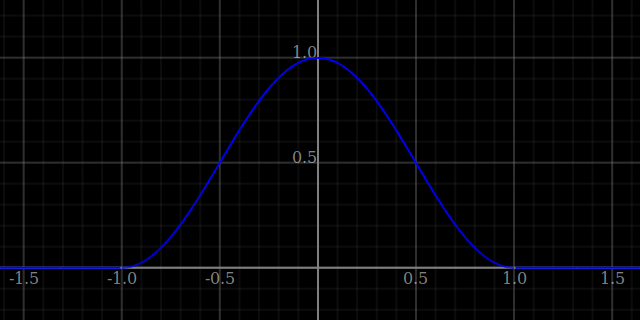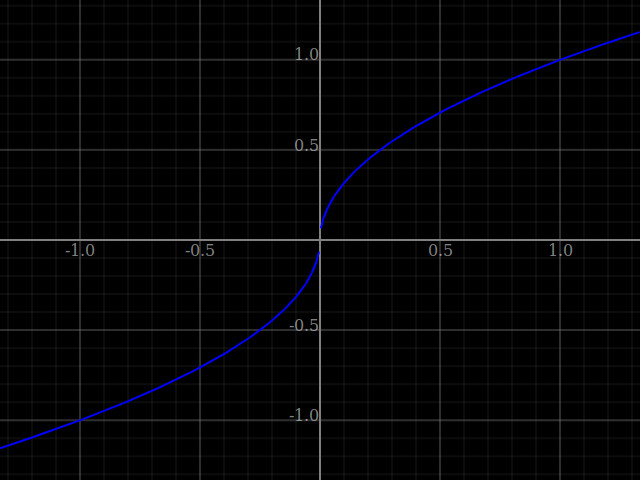| Copyright | (c) Justus Sagemüller 2015 |
|---|---|
| License | GPL v3 |
| Maintainer | (@) sagemueller $ geo.uni-koeln.de |
| Stability | experimental |
| Portability | portable |
| Safe Haskell | None |
| Language | Haskell2010 |
Data.Function.Differentiable
Contents
Description
- data Differentiable s d c
- data RWDiffable s d c
- (?->) :: (RealDimension n, LocallyScalable n a, LocallyScalable n b, LocallyScalable n c, SimpleSpace (Needle b), SimpleSpace (Needle c)) => RWDfblFuncValue n c a -> RWDfblFuncValue n c b -> RWDfblFuncValue n c b
- (?>) :: (RealDimension n, LocallyScalable n a, SimpleSpace (Needle a)) => RWDfblFuncValue n a n -> RWDfblFuncValue n a n -> RWDfblFuncValue n a n
- (?<) :: (RealDimension n, LocallyScalable n a, SimpleSpace (Needle a)) => RWDfblFuncValue n a n -> RWDfblFuncValue n a n -> RWDfblFuncValue n a n
- (?|:) :: (RealDimension n, LocallyScalable n a, LocallyScalable n b, SimpleSpace (Needle a), SimpleSpace (Needle b)) => RWDfblFuncValue n a b -> RWDfblFuncValue n a b -> RWDfblFuncValue n a b
- backupRegions :: (RealDimension n, LocallyScalable n a, LocallyScalable n b) => RWDiffable n a b -> RWDiffable n a b -> RWDiffable n a b
- data Region s m
- smoothIndicator :: LocallyScalable ℝ q => Region ℝ q -> Differentiable ℝ q ℝ
- discretisePathIn :: (WithField ℝ Manifold y, SimpleSpace (Needle y)) => Int -> ℝInterval -> (RieMetric ℝ, RieMetric y) -> Differentiable ℝ ℝ y -> [(ℝ, y)]
- discretisePathSegs :: (WithField ℝ Manifold y, SimpleSpace (Needle y)) => Int -> (RieMetric ℝ, RieMetric y) -> RWDiffable ℝ ℝ y -> ([[(ℝ, y)]], [[(ℝ, y)]])
- continuityRanges :: WithField ℝ Manifold y => Int -> RieMetric ℝ -> RWDiffable ℝ ℝ y -> ([ℝInterval], [ℝInterval])
- regionOfContinuityAround :: RWDiffable ℝ q x -> q -> Region ℝ q
- analyseLocalBehaviour :: RWDiffable ℝ ℝ ℝ -> ℝ -> Option ((ℝ, ℝ), ℝ -> Option ℝ)
- intervalImages :: Int -> (RieMetric ℝ, RieMetric ℝ) -> RWDiffable ℝ ℝ ℝ -> ([(ℝInterval, ℝInterval)], [(ℝInterval, ℝInterval)])
Everywhere differentiable functions
data Differentiable s d c Source
The category of differentiable functions between manifolds over scalar s.
As you might guess, these offer automatic differentiation of sorts (basically, simple forward AD), but that's in itself is not really the killer feature here. More interestingly, we actually have the (à la Curry-Howard) proof built in: the function f has at x₀ derivative f'ₓ₀, if, for¹ ε>0, there exists δ such that |f x − (f x₀ + x⋅f'ₓ₀)| < ε for all |x − x₀| < δ.
Observe that, though this looks quite similar to the standard definition of differentiability, it is not equivalent thereto – in fact it does not prove any analytic properties at all. To make it equivalent, we need a lower bound on δ: simply δ gives us continuity, and for continuous differentiability, δ must grow at least like √ε for small ε. Neither of these conditions are enforced by the type system, but we do require them for any allowed values because these proofs are obviously tremendously useful – for instance, you can have a root-finding algorithm and actually be sure you get all solutions correctly, not just some that are (hopefully) the closest to some reference point you'd need to laborously define!
Unfortunately however, this also prevents doing any serious algebra with the
category, because even something as simple as division necessary introduces
singularities where the derivatives must diverge.
Not to speak of many e.g. trigonometric functions that are undefined
on whole regions. The PWDiffable and RWDiffable categories have explicit
handling for those issues built in; you may simply use these categories even when
you know the result will be smooth in your relevant domain (or must be, for e.g.
physics reasons).
¹(The implementation does not deal with ε and δ as difference-bounding reals, but rather as metric tensors which define a boundary by prohibiting the overlap from exceeding one. This makes the category actually work on general manifolds.)
Instances
| type UnitObject (Differentiable s) = ZeroDim s | |
| type PointObject (Differentiable s) x = () | |
| type Object (Differentiable s) o = LocallyScalable s o | |
| type PairObjects (Differentiable s) a b = () | |
| type AgentVal (Differentiable s) a v = GenericAgent (Differentiable s) a v |
Region-wise defined diff'able functions
data RWDiffable s d c Source
Category of functions that, where defined, have an open region in
which they are continuously differentiable. Hence RegionWiseDiff'able.
Basically these are the partial version of PWDiffable.
Though the possibility of undefined regions is of course not too nice
(we don't need Java to demonstrate this with its everywhere-looming null values...),
this category will propably be the “workhorse” for most serious
calculus applications, because it contains all the usual trig etc. functions
and of course everything algebraic you can do in the reals.
The easiest way to define ordinary functions in this category is hence
with its AgentValues, which have instances of the standard classes Num
through Floating. For instance, the following defines the binary entropy
as a differentiable function on the interval ]0,1[: (it will
actually know where it's defined and where not. And I don't mean you
need to exhaustively isNaN-check all results...)
hb :: RWDiffable ℝ ℝ ℝ hb = alg (\p -> - p * logBase 2 p - (1-p) * logBase 2 (1-p) )
Instances
| type UnitObject (RWDiffable s) = ZeroDim s | |
| type PointObject (RWDiffable s) x = () | |
| type Object (RWDiffable s) o = (LocallyScalable s o, SimpleSpace (Needle o)) | |
| type PairObjects (RWDiffable s) a b = () | |
| type AgentVal (RWDiffable s) d c |
Operators for piecewise definition
Because the agents of RWDiffable aren't really values in Hask, you can't use
the standard comparison operators on them, nor the built-in syntax of guards
or if-statements.
However, because this category allows functions to be undefined in some region,
such decisions can be faked quite well: ?-> restricts a function to
some region, by simply marking it undefined outside, and ?|: replaces these
regions with values from another function.
Example: define a function that is compactly supported on the interval ]-1,1[, i.e. exactly zero everywhere outside.
Graphics.Dynamic.Plot.R2> plotWindow [fnPlot (\x -> -1?<x?<1?->cos (x*pi/2)^2?|:0)]

Note that it may not be necessary to restrict explicitly: for instance if a square root appears somewhere in an expression, then the expression is automatically restricted so that the root has a positive argument!
Graphics.Dynamic.Plot.R2> plotWindow [fnPlot (\x -> sqrt x ?|: -sqrt (-x))]

(?->) :: (RealDimension n, LocallyScalable n a, LocallyScalable n b, LocallyScalable n c, SimpleSpace (Needle b), SimpleSpace (Needle c)) => RWDfblFuncValue n c a -> RWDfblFuncValue n c b -> RWDfblFuncValue n c b infixr 4 Source
Require the LHS to be defined before considering the RHS as result.
This works analogously to the standard Applicative method
(*>) :: Maybe a -> Maybe b -> Maybe b Just _*>a = a _*>a = Nothing
(?>) :: (RealDimension n, LocallyScalable n a, SimpleSpace (Needle a)) => RWDfblFuncValue n a n -> RWDfblFuncValue n a n -> RWDfblFuncValue n a n infixl 5 Source
Return the RHS, if it is less than the LHS. (Really the purpose is just to compare the values, but returning one of them allows chaining of comparison operators like in Python.) Note that less-than comparison is equivalent to less-or-equal comparison, because there is no such thing as equality.
(?<) :: (RealDimension n, LocallyScalable n a, SimpleSpace (Needle a)) => RWDfblFuncValue n a n -> RWDfblFuncValue n a n -> RWDfblFuncValue n a n infixl 5 Source
Return the RHS, if it is greater than the LHS.
(?|:) :: (RealDimension n, LocallyScalable n a, LocallyScalable n b, SimpleSpace (Needle a), SimpleSpace (Needle b)) => RWDfblFuncValue n a b -> RWDfblFuncValue n a b -> RWDfblFuncValue n a b infixl 3 Source
Try the LHS, if it is undefined use the RHS. This works analogously to
the standard Alternative method
(<|>) :: Maybe a -> Maybe a -> Maybe a Just x<|>_ = Just x _<|>a = a
Basically a weaker and agent-ised version of backupRegions.
backupRegions :: (RealDimension n, LocallyScalable n a, LocallyScalable n b) => RWDiffable n a b -> RWDiffable n a b -> RWDiffable n a b Source
Replace the regions in which the first function is undefined with values from the second function.
Regions within a manifold
A pathwise connected subset of a manifold m, whose tangent space has scalar s.
smoothIndicator :: LocallyScalable ℝ q => Region ℝ q -> Differentiable ℝ q ℝ Source
Represent a Region by a smooth function which is positive within the region,
and crosses zero at the boundary.
Evaluation of differentiable functions
Arguments
| :: (WithField ℝ Manifold y, SimpleSpace (Needle y)) | |
| => Int | Limit the number of steps taken in either direction. Note this will not cap the resolution but length of the discretised path. |
| -> ℝInterval | Parameter interval of interest. |
| -> (RieMetric ℝ, RieMetric y) | Inaccuracy allowance ε. |
| -> Differentiable ℝ ℝ y | Path specification. |
| -> [(ℝ, y)] | Trail of points along the path, such that a linear interpolation deviates nowhere by more as ε. |
Arguments
| :: (WithField ℝ Manifold y, SimpleSpace (Needle y)) | |
| => Int | Maximum number of path segments and/or points per segment. |
| -> (RieMetric ℝ, RieMetric y) | Inaccuracy allowance δ for arguments (mostly relevant for resolution of discontinuity boundaries – consider it a “safety margin from singularities”), and ε for results in the target space. |
| -> RWDiffable ℝ ℝ y | Path specification. It is recommended that this
function be limited to a compact interval (e.g. with
|
| -> ([[(ℝ, y)]], [[(ℝ, y)]]) | Discretised paths: continuous segments in either direction |
regionOfContinuityAround :: RWDiffable ℝ q x -> q -> Region ℝ q Source